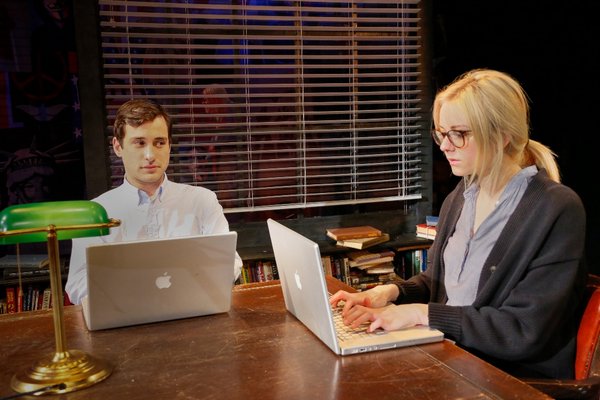
Do you believe the Occupy Wall Street movement accomplished much, or anything at all? Was it all just a free-form exercise in letting the one-percent know that the rest of us were fed up, and achieved nothing in the end?
How you answer may determine your reaction to “The New Sincerity,” a comedy/drama in a world premiere by Alena Smith and directed by Bob Balaban, currently staging at Bay Street Theater in Sag Harbor.
Whether you give Occupy Wall Street a thumbs up or down, you are still likely to applaud the not-so-gentle satirical take on literary types and tropes and unfocused street demonstrators that are the subject of this offering.
“The New Sincerity” pokes fun at wealthy literati who bankroll obscure highbrow journals, today’s crop of single men in their 30s who have no intention of settling down until they need a brood mare 20 years younger to procreate, as well as the rich kids who may be sleeping in the park, but also sleeping around. As for that new sincerity? It may not be so real after all.
The story revolves around a most sincere writer, Rose—portrayed by Justine Lupe—whose lengthy essay on the Triangle Shirtwaist Factory fire was recently published by Benjamin—acted by Teddy Bergman—a twit of an editor engaged to someone off on her Fulbright, but who is about to inherit a swell and commodious apartment from her uncle, once a communist. She’s apparently cold as ice, but will be a literary light as soon as her book on the death of political involvement within her own generation is published.
Rose has fond feelings for Benjamin, but one wonders why. He is such a climber and a doofus to boot about matters of the heart, or any sincerity at all. Against his explicit wishes, Rose gets involved with the people occupying the park across the street from the magazine’s office. In bumbles one of the better-known occupiers—supposedly there are no leaders in their classless society—who goes by the sexy moniker of Django, portrayed by Peter Mark Kendall. In and out of this band of players—all excellently acted—bounces the intern Natasha, portrayed by Elvy Yost.
Ms. Yost absolutely lights up the stage with every entrance. Ms. Smith gave the insouciant intern the brightest and best lines, and Ms. Yost bends them to her liking with perfect timing and to our unalloyed enjoyment. Natasha’s honest take on reality cuts through the layers of BS that surround a magazine with the affected name of “Asymptote,” which, to the uninformed, refers to a mathematical line that goes on into infinity past the curve. Or something like that.
We are not meant to like either of the men. Benjamin is cold, vapid and without a moral center. When you think he’s about to finally kiss Rose, he’s worried about hair loss. He’s against the occupiers in the park until he can use them. He gets arrested so he can write a piece about the experience. And Django the Occupier is a sham in his flannel shirt when he turns out to be something else after all.
The writing portrays both men as single-dimensional asses, neither honorable or nice—but their types will be familiar to many a woman who have spent time dating among the literati and/or earthy guys hustling while they save the world.
You know how some of David Mamet’s women are impossible to stomach—or believe? But the largely male troupe of New York critics takes that as a matter of course? Ms. Smith gives us men just as infuriating. It’s refreshing to see the tables turned, for once, by a woman writer under the crisp direction of Mr. Balaban.
The East End resident has a long list of stellar credits—he’s been in nearly 100 films—but to me he will always be the wonderfully droll Hollywood director he portrayed in Robert Altman’s “Gosford Park.” Now that self-same director is in action with just the kind of material of manners, mores and politics his character might have relished.
The set is Broadway worthy—no surprise here because the set designers Beowulf Boritt and Alexis Distler bring Broadway and assorted Manhattan credits to Bay Street. Even the details are right: the books piled up on the stage really do have revolutionary themes. A striking montage of posters from this-or-that movement is the backdrop of the office-apartment where the action takes place in a single and brisk 85-minute act.
Scene changes are marked by a darkened stage, music from rap to folk fills the void, and clever lighting by Mark Billings makes an image on the venetian blinds informing the audience that day has become night, September has turned into December.
You will leave Bay Street with something to talk about afterward—and, depending on your generation, it may be whether the Vietnam protests were about war in a faraway place, or the draft; whether the demonstrations against the Iraq War had impact; or back to Occupy Wall Street, which was much more ambiguous in intent. Civil rights marches and lunch counter sit-ins don’t belong in this category because they were not only necessary, they accomplished a great deal.
With its timely take on public protests versus generational apathy, on literary climbing and apartment scarcity in Manhattan, “The New Sincerity” is likely to have legs well beyond Bay Street.
You might as well say you saw it when. YOLO, as Natasha would insist.
IMHO.
“The New Sincerity” will stage on Wednesdays at 7 p.m., Thursdays, Fridays and Saturdays at 8 p.m., and Sundays at 2 and/or 7 p.m., through June 14. Tickets start at $60.75. For a complete list of show times and tickets, call (631) 725-9500, or visit baystreet.org.